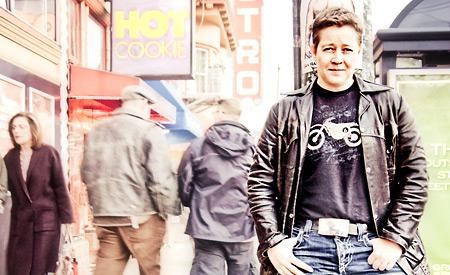There is something about listening to someone tell a good story that touches people and makes them feel connected.
That’s a big part of what the Whoop-di-doo storytelling series is all about. Jomichele Seidl, assistant chief librarian at Powell River Public Library, organizes Whoop-di-doo and is gearing up for the third annual event featuring Vancouver-based storyteller Ivan E. Coyote this Saturday, February 12.
“Before the library began the Whoop-di-doo series, there really weren’t any high profile, extravaganza storytelling events per se, especially not for adults,” Seidl said. “Before the first event someone asked me a question that made me realize what I was up against. ‘Why would a bunch of adults want to sit around and listen to stories?’ After the first Whoop-di-doo, that same person told me she had had tears running down her face from laughing so hard at one of Ivan Coyote’s stories.
“There is something wonderful and timeless, about seeing adults so completely drawn into a story that they are childlike in their lack of self consciousness,” Seidl said. “Their mouths gape open, their faces grimace in sympathy with the narrative, they gasp in horror, they roar with laughter. It’s beautiful, it’s simple, it’s magic.”
Coyote learned her trade sitting around her grandma’s kitchen table in Whitehorse in the 1970s. “There are lots of other storytellers in my family,” she said. “They don’t tell stories professionally, but my Uncle Rob is a great storyteller, both my grandmas, my dad—it’s just an organic thing in my family.”
Since she started doing open-mic performances in the mid-1990s, Coyote has become a well-known writer and performance artist. She says she is involved in the oldest profession there is.
“[Storytelling] is not uncommon, it may just not always be recognized for what it is. Lots of folk artists, writers, musicians, anyone who gives a great performance includes an element of storytelling [that] gives some insight into the person behind the song, or whatever.”
One of the best things about storytelling, Coyote continues, is that it’s immediate and intimate, and that, “I can take people on a journey with me. I love how a good story crosses all cultural, sexual, gender boundaries. I know that when someone is enjoying a story of mine, when something resonates for them, it’s because of how alike we are, not because of how we are different.” She also loves “how stories beget stories…storytelling levels out the playing field so that we’re all just human. There’s not a lot of pretension. Another thing I like about it is that it’s very accessible.” Coyote remembers someone who came to talk to her when she was at a book signing once. “He came up to me and said, ‘One of the things I love about [your storytelling] is that it makes me feel like I could do it.’…That was a huge compliment.”
Coyote and the Whoop-di-doo series is inspiring Powell Riverites to tell their stories too. A storytelling group, the River City Storytellers, formed in the spring of 2009 and it has been growing in popularity, Seidl said. Whoop-di-doo always features a few local storytellers, and the demand for these few spaces has increased so that next year auditions will be held.
“We actually have an abundance of people wanting to tell their stories on the big stage,” Seidl said. “These local storytellers add so much depth to the programs, some of them coming from Sliammon, some coming from River City Storytellers, and some from Toastmasters. We also have people coming from the performing arts who would like to try their hand at storytelling.”
This renewed interest in local storytelling can only be a good thing. “I believe that storytelling is the foundation for literacy,” Seidl continued. “Being able to tell your story is such a primal need. To tell a story requires a grasp of language, and a sense of narrative or plot. You must be able to organize your thoughts in a sequence that makes sense to the listener. You must decide what is extraneous, and what is essential to the story. If we didn’t have important stories to tell—who we are, what we’ve experienced, what wisdom we have to convey, what we know and understand about our world—why would we even need the written word? Print and digital formats allow that story to transcend time and space, so that it can travel far and be passed through the ages. But it all begins with storytelling.”
Along with her 7 pm performance at Max Cameron Theatre, Coyote will be holding a storytelling workshop in Powell River over the weekend to help people work on their own stories. “I want people to be empowered to search their own lives for their stories,” she said. “I know how healing and powerful storytelling can be, and has been in my own life. I think the world would be a better place if we were all listening to each other a little more.”
Emma Levez Larocque is Literacy Outreach Coordinator.



